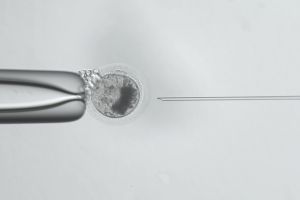EMBRYO PRODUCTION ALL YEAR ROUND
WHAT IS THE OPU-ICSI TECHNIQUE?
This is a commercially used equine reproductive technique used for in-vitro embryo production from genetically superior mares and/or stallions. Donor eggs are extracted through follicular aspiration (OPU) for subsequent intracytoplasmic sperm injection (ICSI), where a single sperm is injected into each egg.
TRUST THE SPECIALISTS
WHAT IS THE OPU-ICSI TECHNIQUE?
This is a commercially used equine reproductive technique used for in-vitro embryo production from genetically superior mares and/or stallions. Donor eggs are extracted through follicular aspiration (OPU) for subsequent intracytoplasmic sperm injection (ICSI), where a single sperm is injected into each egg.
EMBRYO PRODUCTION ALL YEAR ROUND
How it is performed?
OPU – Follicular Aspiration
OPU (Ovum Pick-Up), or follicular aspiration, is the process by which oocytes (eggs) are collected directly from a mare’s ovaries using a transvaginal ultrasound-guided procedure (TVA). The mare is sedated, and the procedure can take from 20 to 60 minutes, depending on the number of follicles present in the ovaries.
Laboratory: egg maturation, sperm injection (ICSI), embryo culture and vitrification
Egg maturation: The oocytes obtained from the aspiration are matured in the laboratory until they are ready for fertilisation.
Sperm injection: A single sperm is injected into each mature oocyte, using the ICSI (Intracytoplasmic Sperm Injection) technique.
Embryo culture: The injected oocytes are cultured in the laboratory until they reach the embryo stage.
Vitrification: The technique used to freeze the embryos. All the resulting embryos are vitrified and stored in liquid nitrogen for subsequent transfer into a recipient mare.
Vitrified embryos enable the client and veterinarian to plan, prepare and select the best recipient. Moreover, it is possible to schedule the transfer in accordance with the best dates for the birth.
Embryo transfer and birth of the foal
Transfer: Embryos are devitrified and transferred to a synchronised recipient mare (D4/D5 post ovulation).
Birth: After a gestation period of 11 months, the recipient mare will give birth to a foal.
Performing OPU-ICSI
In Mares:
1. Older mares that no longer respond to conventional transfer or insemination programmes.
2. Mares with acquired reproductive problems: endometritis; problems in the uterus, oviduct or cervix.
3. OPU-ICSI can be performed all year round, at any stage of the donor’s reproductive cycle, as long as follicles are present.
4. Mares that develop follicular waves, but do not ovulate.
In Stallions:
1. Stallions with low sperm quality and motility.
2. Stallions with a limited availability of sperm, or for high-cost straws: for ICSI the straw is cut, and 1/10 (approximately 1 cm) is used at each session.
FREQUENTLY ASKED QUESTIONS ABOUT OPU-ICSI
What is the average number of embryos produced per OPU-ICSI session?
The average number of embryos produced per OPU is 1-3.

Factors influencing the number of embryos produced in an OPU-ICSI session
- Oocyte quality, which can be affected by the advancing age of donors, in addition to the use of medications, diseases, inadequate nutrition, and individual effects.
- Sperm quality, which may be affected by diseases, individual effects of subfertility, the use of drugs that impair spermatogenesis, or by the incorrect storage of straws.
- Donor follicular preparation and control: the more follicles there are in the ovary, the greater the chance of embryo production (although quantity does not necessarily imply quality).
What is the minimum interval between one follicular aspiration and another?
Although it may vary from one individual to another, we recommend a minimum interval of 21 days. This is the time needed for the donor ovary to recover a satisfactory number of follicles for retrieval.
Are there any risks for the donor mare associated with the OPU technique?
As with any invasive technique, there are risks during or after the follicular aspiration procedure. Our qualified team of veterinarians is trained to avoid risk situations as far as possible, and action protocols can be activated quickly and efficiently.
Do vitrified embryos have good pregnancy outcomes?
Yes, the quality of the embryos distributed by Ovohorse, whether fresh or frozen, are the same: Grade 1. Vitrification also makes it possible to programme, prepare and select the best recipient, therefore increasing pregnancy success rates.
Is OPU-ICSI a reproductive biotechnology that is going to replace Conventional Embryo Transfer (flushing)?
No! OPU-ICSI and Conventional Embryo Transfer (flushing) are biotechnologies with different objectives and indications.
OPU-ICSI is emerging as an alternative option to solve problems such as producing embryos from mares that are no longer able to do so in the normal way, whether due to advanced age or acquired reproductive problems. Additionally, the use of high-cost straws, or those with a low number of units on the market can be optimised. It also allows the use of straws from stallions with low motility, as well as year-round embryo production.
The two techniques can even be used together, provided the OPU and flushing dates are correctly scheduled.
- An alternative embryo production technique for mares that no longer produce embryos in the normal way, whether due to advanced age or acquired reproductive problems.
- Optimisation of the use of straws with low availability on the market, or of high commercial cost, as only about 1cm of the straw is used for each OPU session.
- Adapting to suit the mare’s competition calendar.
- Semen doses from subfertile or infertile stallions can be used, as the fertilisation process is carried out in the laboratory.
- Embryos produced can be cryopreserved (frozen) and transferred at the time planned and requested.
FIND OUT MORE
FOLLOW US
FIND OUT MORE













































































